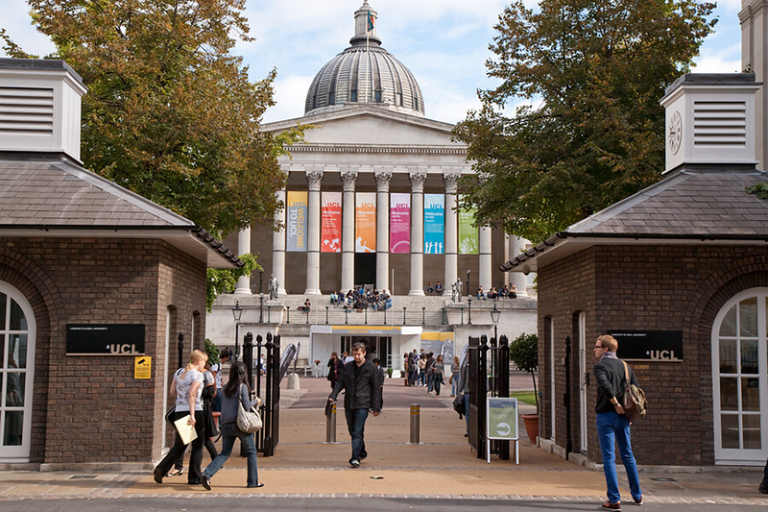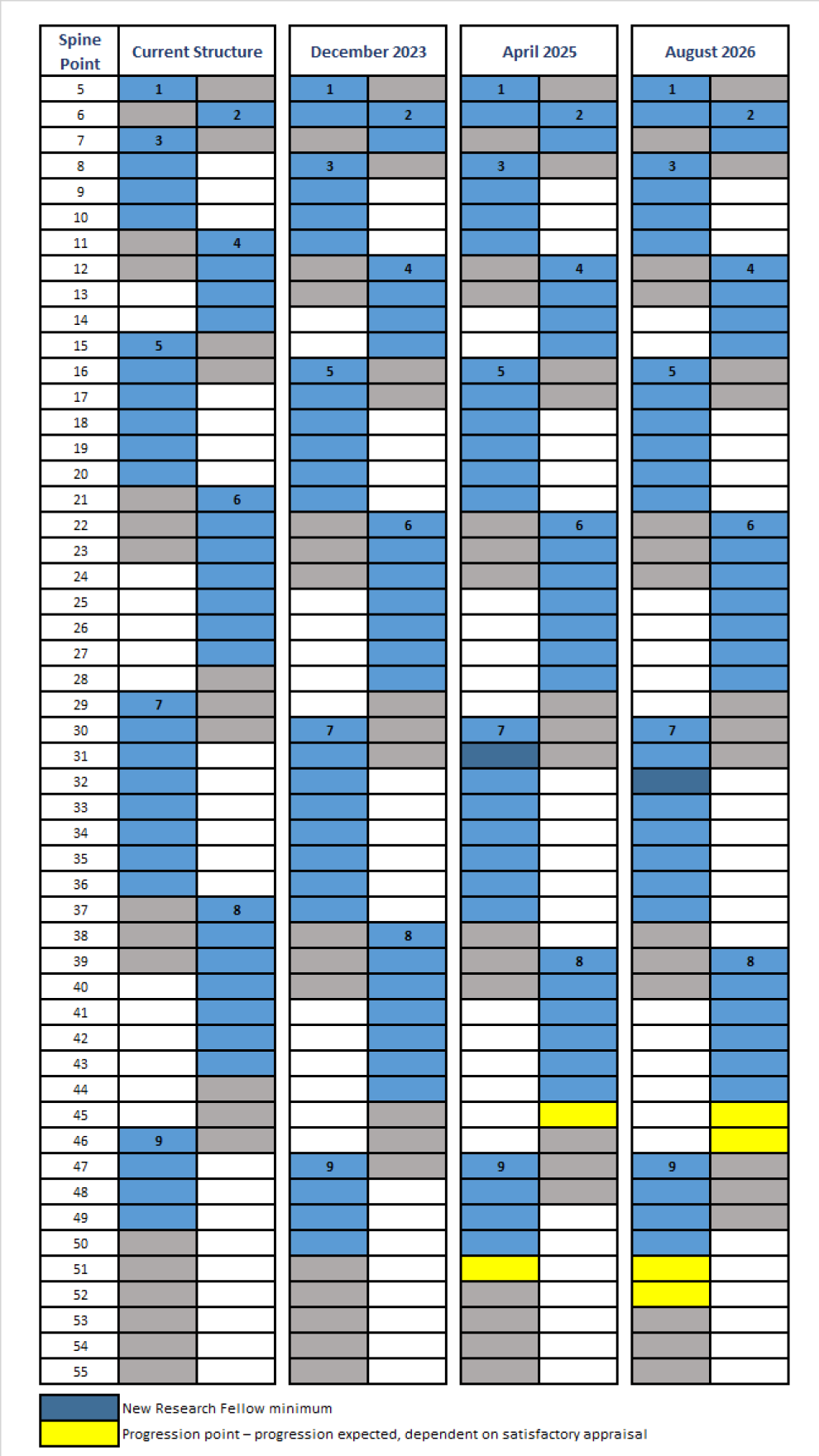Implementation of new pay and reward strategy
20 July 2023
UCL’s University Management Committee has approved a new pay and reward strategy, and we are delighted to share the initial details below.

The strategy reflects our status as a world-leading international university, and the need to continue to recruit, motivate and retain excellent staff.
The package below represents an investment of £110.2m in our staff salaries over the next four years. More information can be found below, but here is a summary of the key aspects:
- The overall median pay increase for UCL staff in 2023 will be 9.5% including incremental progression and the national pay settlement.
- Further increases in the London Allowance – This will be increased to £4,500 from August 2023 for all staff and then to £5,000 from December 2023 for staff in Grades 1-7. This measure is aimed at providing a significant and immediate flat rate rise to our middle and lower paid staff while also improving the gender, ethnicity and disability pay gaps.
- Raising the maximum increase to pay scales for Grades 1-9 – Staff, out of probation, who have been at the top of the existing automatic grade zone on 1 August 2022 will move up an increment from December 2023, and all staff within the normal zone of Grades 1-9 will now progress to higher points in the longer term than under the current structure. Over time, we are introducing longer salary scales which will allow for incremental increases over a longer time period, and over the next three years the top of Grade 8s and Grade 9s will rise by 9%
- Support for early career researchers – We are also working to improve the experience of our early career researchers by improving the promotion process for this group. We will begin to pay visa costs for out of country applicants who want to come to UCL. That will eliminate a significant current barrier to recruiting top, global research talent.
- Wider reward package for professorial staff – We are also planning positive changes to related policies and procedures, including promotions and the banding of Professorial Research Fellows and Professors (Teaching), and we will work to improve the consistency and completion of appraisals. More details on this will follow later this year.
- Improving sabbatical entitlement – We are also looking at what a better sabbatical scheme for researchers might look like that meets the needs of our researchers better, particularly those in long-form disciplines, and are looking at setting aside the resources needed for this.
The adjustments will also be applied to cleaning, catering, portering and security colleagues working for partner organisations. The significant rises to the lower end of our scale will move us substantially higher above the London Living Wage; we are an accredited member of that scheme.
A priority in this new strategy has been to enable larger initial rises to staff at lower/mid pay points in Grades 1-7 this year, with longer term rises to our pay structure at mid- higher- levels where we know our salaries are less competitive than at some other institutions.
Our local pay grading and reward strategy is separate from ongoing national pay negotiations led by UCEA, on behalf of a significant number of higher education institutions, with the trade unions (which you can read more about here). The changes have been planned for a long time as part of a pre-planned recruitment and retention strategy for our staff and as an outcome of the investment priorities made through our Strategic Plan 2022-27 to focus on improving our staff pay grading and infrastructure. They reflect a need to look again at UCL’s grading structure and we do not want to hold back from this on-going, important work. We continue to operate within national pay bargaining and will implement any pay uplifts negotiated by UCEA (including the upcoming national pay award from 1 August).
Our new strategy will be based on several overarching principles with a series of initiatives under each. More detail will follow on further initiatives such as Grade 10 remuneration and sabbaticals.
For now, you can find more information below about the key, initial changes agreed by UMC and how these will affect staff.
- Competitive and fair base pay
- We will raise the London allowance to £4,500 for all applicable staff from 1 August 2023 and we will then raise the London allowance to £5,000 for staff in pay points equivalent to Grades 1-7 from 1 December 2023.
- The raise on 1 August 2023 is a further £300 rise in London allowance above the 5% we have already increased it by from February this year. This will be applied to all staff who have the current UCL rate of London allowance of (£4,200). It will also apply to those who currently receive a fringe allowance, for whom it is already agreed we will harmonise up with the full UCL rate from August.
- The further raise from 1 December 2023 will mean a £1,000 rise in London allowance in 2023 and a >£1,500 rise in London allowance since July 2022 for staff in Grades 1-7. This allows us to provide a significant and immediate flat rate rise to our middle and lower paid staff, while also improving the gender, ethnicity and disability pay gaps.
- We continue to benchmark salaries against relevant peer groups (all sectors for professional services role and the Russell Group for academic positions) and that benchmarking has demonstrated that change is needed. As such, we will adjust our average rates of pay over the next 3 years towards external benchmarks via staggered, financially sustainable adjustments to our grading structure. The changes are shown below, with the first set of changes taking effect from 1 December 2023.
- We are aware that a high number of staff have been at the top point of their grade for significant periods. From December, anyone in the top normal (blue) point of a grade on 1 August 2022, will increment to the new higher point. This will mean that all Grade 1 to 9 staff (out of probation and within the normal/blue zone of the grade) will have incremented in 2023.
Overview of pay scale changes

In summary this will:
- Add a new point of automatic progression to all our Grades 1-9. 3,000 staff will progress to these new points in December 2023, and by August 2026 6,142 staff will have benefitted from the new higher maximum salary. On average each increment is worth 3% of salary.
- Delete the minimum point for Grades 3-7 and move applicable staff up to the new minimum. This will raise the minimum salary of the grade by 3% for these grades.
- Following our rise to the Research Assistant scale last year, we will also raise the Research Fellow minimum further in April 2025 and August 2026 so that the Research Fellow minimum salary is point 32, rather than the lowest point of Grade 7 (point 30). This makes the salaries more competitive with external rates.
- Add three points to the top of Grades 8 and 9 in total. We will also delete the bottom point of Grade 9 and the bottom two points of Grade 8 to bring us closer to benchmarks. The top two points (yellow) in Grades 8 and 9 will be known as “Progression Points” and will be introduced in April 2025 and August 2026. All staff who have had an appraisal will advance to these points, unless they are within the capability or disciplinary process. At both grades the additional three increments will move the maximum salary up 9% – much more in line with academic and professional services benchmarks.
We will increase the professorial band 1 minimum (and maximum) salary by 2.5% in August 2024 and further 2.5% in August 2025. We will similarly move up the minimum salary for Grade 10 professional services staff to point 52, then point 53 over the same timescale. Staff below the new levels will be moved up to the new rates from that point.
We will also ensure that the performance and pay review process for Grade 10 staff is aligned with our senior promotions timing and that the pay review mechanism is adequate to motivate and retain top talent- incentivising excellence.
- Increasing equity and transparency
- The government has announced significant increases to the cost of visas/immigration health surcharge etc. UCL meets the cost of in-country visa requests, but not for those applying out of country and researchers do not currently receive relocation assistance to help with this. From December 2023 we have agreed to meet the visa costs of researchers who apply for visas out of country to ease a significant barrier to attracting global research talent. We will cover a three-year visa/immigration health surcharge (capped at £4k) and we will monitor the effect of this policy change.
- UCL has been working hard to reduce its gender pay gap and the December 2023 rises outlined here will have a positive effect on overall gaps. We will build on this to further reduce our gender pay gaps. UCL has already gone beyond most organisations to publish its ethnicity and disability pay gaps and we will find new solutions and work on ways to narrow these pay gaps.
- Wider changes to follow
- We are undertaking a review and will improve the consistency and overall experience of early career researchers, ensuring that best practice is commonly used across UCL. More detail will follow in due course.
- By the end of 2023, we will reform the professorial banding criteria to allow Professors (Teaching) and Professorial Research Fellows to be rebanded (from the 2024 round onwards) where contribution is high.
- We will now review our current sabbatical policy with a view to increasing the frequency of sabbatical opportunities. More details will follow in due course.
These are substantial changes which we wanted to let you know about as soon as possible. Please be assured that we will shortly publish further detail, alongside the overarching strategy, and we will also be hosting drop-in sessions for staff to ask further questions. In the meantime, please visit our Frequently Asked Questions page.
Thanks again for your contributions to UCL.
 Close
Close

